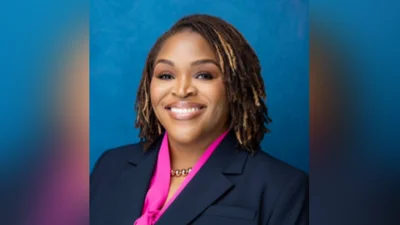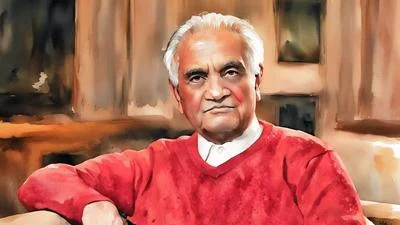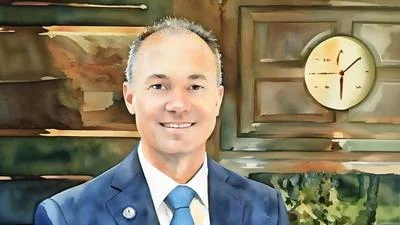Leslie Graves is the founder and publisher of Ballotpedia, a nonprofit digital encyclopedia of American elections, politics, and policy.
Federal Newswire
Why did you start Ballotpedia?
Leslie Graves
Well I live in Wisconsin, which does not have a ballot initiative process where people can collect signatures to refer a question for the state's voters. I've always loved that process.
When we started Ballotpedia in 2007, the only reason for its existence was to write encyclopedic one-stop shopping articles about all of the country's ballot initiatives. There were 200 of them every two years, and that was really all that we wanted to do. Why did we want to do that? It was because they're kind of complicated. There are 20 or 25 different pieces that you need to weave together for people to really understand what a ballot measure is all about.
We didn't think it was…[good] for people to have to go [all over the internet to] find out who gave them money, how many signatures they needed, [or to get] the actual text that you'd be voting on. The idea was just to put it all in one place, to make it easier for people, and to do that in a neutral way so they could feel really confident about the information they were getting.
Federal Newswire
Why is it important to have the right information for elections?
Leslie Graves
Oftentimes when people talk about biased media, what they mean is that it only presents right wing or left wing arguments on an issue, and it gives short-shrift to the other side.
We aren't necessarily thinking about it through that lens. We [view it as], they left out half the facts. There might be an article about a lawsuit against a ballot measure. You can read that whole article and at no point, generally speaking, will it tell you the name of the lawsuit or who filed it. That makes it really hard to do deeper research on it. That's just one example of many. We're not trying to write articles that fully represent both sides of the issues, although when it's appropriate, we absolutely do that.
Federal Newswire
How has Ballotpedia evolved?
Leslie Graves
When we were a year in to our experiment and covering ballot measures, we were only really trying to make beautiful articles for people. We had no idea how many people would want to read them. For all I knew, 10 was the number. Nobody had ever heard about us. But what we learned that first year is that search engines tend to elevate our articles pretty high up in search results because the search algorithms can see that the articles are chock-full of facts.
That's really how we found our audience. It was people who were searching for factual information.
We also found out there's a lot of them. We've never been in despair about the American voting public because we see through our traffic every year just how hard they're working to get out there and find information. They're not just looking in their typical left or right echo chambers. They're going to their search engine to do some independent searching and find what they can about this. There's a ton of that going on. I find that very inspiring. These are people doing their homework.
Then I thought, well, if there's that many people who want to know about statewide ballot measures, are there people who want to know about local ballot measures? Are there other people who want to know about the state Supreme Court justices? Are there people who want to know about state senators and the other down-ballot things?
Over the years, we gradually added more and more information or content areas. Now we have 425,000 articles and we cover the Presidency down to very local issues.
But we still have a long way to go to build out the bottom of the ballot because there are 500,000 locally elected officers in the United States, and we're only covering about 50,000 of them. We have 450,000 more to go.
Federal Newswire
How do you cover school board races?
Leslie Graves
Across the country, there are 13,500 school districts. There are 80-83,000 elected school board members. That's a big job. In 2023, we experimented with covering all school board elections in 10 states. We just wanted to see if we could do it.
One thing handled at the local level is the administration of elections. The way people in these counties administer their elections might be very different from the way that the people in other counties manage it.
That really affects voters because the way they display the information on the website varies dramatically all over the country. We knew the biggest challenge would be getting the accurate list of candidates in all of those school districts. It was challenging, but we figured out how to do it now on an automated basis.
It doesn't solve the problem for people if we make it easy for them to discover a month before the election. Names of the people who are running for school board isn't enough. You also need robust information [so people can determine if this is] the one they agree with or not agree with.
We have a number of ways we're working on that. One of the ways is through doing a candidate survey that all candidates at all levels can fill out. We're getting a lot of those returned, but not nearly as many as we need to really solve the problem for our readers. The other way we're trying to do it is collect information about local endorsing organizations and who they supported in that race.
Federal Newswire
Why is it important to see who has endorsed a candidate?
Leslie Graves
For example, if a school board…candidate was endorsed by Moms for Liberty and another candidate was endorsed by the local teachers union, whatever your predispositions are, that endorsement will make it pretty clear to you which way you want to go. We need to go find that information and impart it back into our pages.
[It’s] a big scaling issue for us. We discovered over 1800 local endorsing organizations.
There is a whole big ecosystem of really interesting little local groups that take as their responsibility to endorse local judicial contests or school board races.
Federal Newswire
How do you handle judicial elections?
Leslie Graves
Federal judges are nominated by the president. We're not going to talk about those. We're just talking about state judges. At the state court level, you have trial judges, appellate judges, state Supreme Courts, and intermediate appeal judges where you can appeal the decisions of the local judges.
Now, those local judges are one of the least understood pieces of the American political landscape. Across the 50 states, there are about 32,000 of them. They have very little competition on the ballot. For example, with the school boards that we covered last year, there were 800 races we were covering. Only 40% of them were contested.
It's not the same when you vote for a judge. You're voting for more abstract qualities, like fairness, judicial temperament, things like things like that. We have found people feel more nervous about voting for judges because they don't feel qualified but we encourage people to.
The way that the states were designed, you're being asked to vote on these judges because people think that you can figure out which judges to vote for, and you can if you have enough information. Increasingly, the judges are filling out our candidate survey. When we started, we weren't sure they would do that, but they did.
Federal Newswire
From your candidate surveys, what are the emerging issues you’re seeing for the 2024 election?
Leslie Graves
On a statewide and a federal level, the two big issues are going to be immigration and abortion. It would appear to me to be the case that those are going to be the ones that are going to be emotional. There are issues that the highly politically engaged among us are deeply fascinated by both on the left and the right, super interested in how elections are conducted.
Another sort of inside baseball thing; it’s very hard to get the average voter, and I speak of the average voter with great love. They will be voting on things like academic outcomes in the school district for their children or grandchildren. Or the condition of the economy, immigration, or abortion. Those are really going to be the big issues.
Federal Newswire
How does Ballotpedia help voters understand these nuanced issues?
Leslie Graves
Our approach to the policies that we cover is a little bit idiosyncratic…I don't think there's anything that I can say to the reading public at any level about abortion that they haven't already heard. Any thoughts anybody might want to have about abortion have already been thought. Everybody understands there's two sides to the issue. They would usually be able to go and read about this side and that side. We just don't think we can contribute to that.
That's true for some other issues as well. But there are smaller issues where we can contribute because people don't know too much about them. They're looking for an overview that explains to them what the whole situation is.
Some of the articles that we write like that are on ranked-choice voting, which is going to be on a bunch of statewide ballot measures in 2024. Many people, [to include those who are] really politically clued in, have heard the phrase “ranked-choice voting” at a cocktail party. If you asked, “can you define that?” They would say, “I'm not really sure.” That's where we can perform a great service, to put it out there in a very comprehensive and neutral way.
We could do that for really niche topics like environmental, social and governmental investing. We do many topics related to the administrative state. We look for issues that people don't already know everything about, where they want a comprehensive overview.
Federal Newswire
Who is your audience?
Leslie Graves
During the year, we have a steady audience with spikes for the primaries. But when you get to mid-September, the traffic starts getting high on Monday the day before the election, and it doesn't go down until Wednesday at noon. Those who come in the last 72 hours before the election are a different part of our audience. Political science studies will show they vote, but their preference is to spend less than 10 minutes a week reading or thinking about politics.
They're not like you and me. They're the people who come in the last week, especially those last few days, they're going to vote, they're going to do their civic duty. They want to get to the download. That's our audience. Then the rest of the time, it's more people [who enjoy reading about politics].
Federal Newswire
Do you think Ballotpedia is helping to improve our public discourse?
Leslie Graves
Yes. I trust people who make last minute snap decisions, and they trust themselves. That's why they're willing to do that. It's just like making a hotel reservation at the very last minute. Some people are willing to do that and some people aren't. I do think there is a thing that last-minute voters have–they have a common sense nature to them.
I think people who are very immersed in the world of politics tend to look down at the segment of people who only make up their minds at the last minute. They're like, “how could it not be very obvious to these people that they should read about politics 20 hours a day–why aren't they like me?”
To think that they're detached or that they're neglecting their civic duty, I don't know. I kind of love them.









